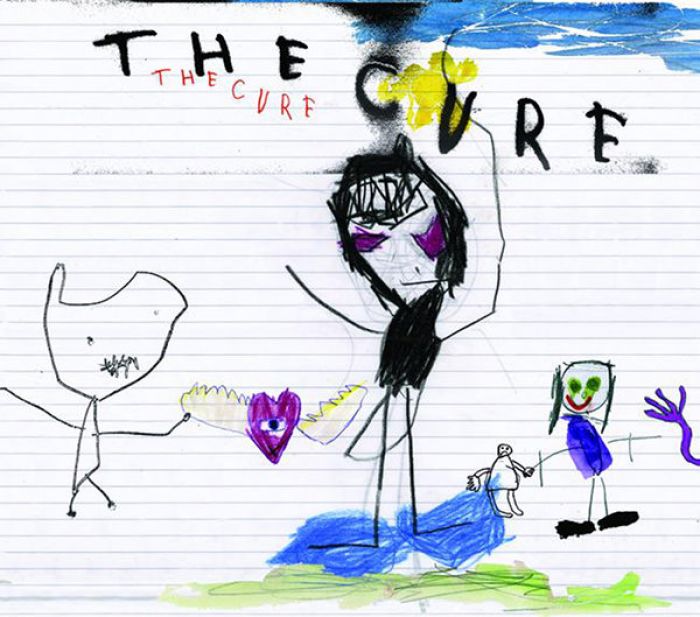The Cure by The Cure (Review)

By now, volumes have probably been written about the fact that The Cure’s Robert Smith has seemingly written himself into a corner, becoming a larger-than-life figure that he’ll never, ever be able to put aside. He’s become a caricature, high school angst personified. And as a result, he (and, by extension, the rest of The Cure) has merely been going through the motions, reenacting the same tired roles, and rewriting the same old songs for the past decade (and perhaps longer, some might argue)… and things just seemed to be going from bad to worse.
Wild Mood Swings revealed a band in the process of becoming a trainwreck. It was a highly discombobulated mess of an album the likes of which hadn’t been seen since Kiss Me, Kiss Me, Kiss Me (there, I said it). And Bloodflowers, the supposed return to form and conclusion of the so-called “Dark Trilogy” (the other parts being Pornography and the band’s magnum opus, Disintegration) was the sound of a band imploding. Smith and Co. had never sounded so tired, so bored with themselves. The roles had been set, only to become stifling and claustrophobic.
With the release of Join The Dots earlier this year, it became obvious that that the band’s discography had been in a slow, steady descent since 1992’s Wish. Something clearly needed to change, since The Cure, famous for their countless break-up rumors, were clearly not going to end anytime soon. However, who could’ve foreseen that the change so drastically needed would require the likes of uber-producer Ross Robinson.
After all, Robinson was the main man responsible for the “new metal” plague that has swept our land, having produced the likes of Korn, Limp Bizkit, Cold, Slipknot, and Vanilla Ice (yes, that Vanilla Ice). A longtime fan of the band, Robinson signed them to his own imprint, I AM Recordings, and set about producing this, their 13th album. But believe it or not, apparently Robinson was just what was needed.
Recent musical history features several aging acts that have been given a new lease on life by the unlikeliest of individuals, much to the chagrin of purists and “true” fans — Johnny Cash had Rick Rubin, Loretta Lynn had Jack White, and now The Cure have Robinson. And in all of those cases, the producers took the artists back to basics, stripping away the dross and reminding them of what made them so great in the first place.
In The Cure’s case, Robinson strips the band’s sound to a much more guitar-oriented attack (gone are many of the synth layers that had increasingly become the band’s stock in trade), hearkening back to their early years, while still keeping much of the pop that comprised Wish (and thankfully forgoing the excess of Wild Mood Swings). A few hiccups aside, the band sounds leaner and meaner than ever before, tearing through album’s 11 tracks in no time at all. Put simply, The Cure is easily the band’s most potent recording in over a decade.
The Cure kicks off with the lethal trio of “Lost,” “Labyrinth,” and “Before Three.” “Lost” finds Smith sounding more desperate than ever, channeling a sense of angst with which lonesome teenagers can identify once again. Smith’s voice is placed high in the mix, almost uncomfortably so, and hearing him scream “I can’t find myself” over churning drums and guitars… well… I’d forgotten what that felt like, it’s been so long.
“Labyrinth” is one of the album’s more sonically interesting songs, full of roiling, middle-eastern textures, and Smith’s phoned-in vocals add a surreal touch. Lyrically, Smith weaves the same potent mix of sex and death, innocence and despair (“Oh tell me it’s the same boy burning in the same bed/Tell me it’s the same blood breaking in the same head”). And while most might point to “The End Of The World” as the album’s single, “Before Three” is a much stronger track. Smith’s knack for turning sappy lines (“The happiest day I ever knew/In a sea of gold down next to you”) into something more affecting is still apparent, and the band matches him musically stride for stride.
I’ll admit that, upon the first few listens, I came close to writing off the rest of the album. However, this is probably the first Cure album in a long time (I keep saying that, don’t I?) that continues to surprise me and draw me in. The darkly atmospheric epic “Anniversary” proves to be a much truer heir to Disintegration’s throne than the whole of Bloodflowers. And “Us Or Them” finds Smith spitting out lines like “Death is with us all/We suck him down with our first breath/And spit him out as we fall” whilst tackling bigotry and paranoia in the way only he can.
As “The Promise” winds down to a close, all that’s eventually left is Smith shouting “And I waited… I’m still waiting.” For a long time, that was the mantra of Cure fans everywhere, as they waited for something good. So does The Cure represent The Cure’s salvation? Not entirely. The album does flounder in spots — “The End Of The World” is a bit too deliriously goofy for its own good (what’s with that Rentals-esque keyboard solo?), and tracks such as “Never” and the 13-minute closer “The Promise” are never quite as compelling as they could or should be. But Robinson’s production has given the band a nice kick in the butt, and the leaner Cure is much nicer than the mopey-with-no-point band that existed beforehand.
This self-titled album certainly represents a much-needed step in the right direction, displaying a newfound confidence and sense of freedom. Hopefully, the band continues in this direction, building further on their newly solid foundation (bringing back some more of those synths would be nice start). While the band’s halcyon days are almost certainly over, it’s nice to hear Smith sound comfortable with his band, his sound, his voice, and his role once more.